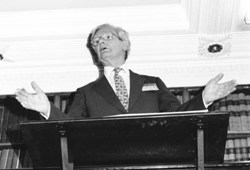 Oil industry geologist who became an expert in the history of geology and the role of the Church of England in its development
Oil industry geologist who became an expert in the history of geology and the role of the Church of England in its development
John Fuller was born at Hastings in Sussex and attended Kent County Grammar school in Bromley, Kent. He spent a year doing National Fire Service during the war before entering Queen Mary College in 1945 to read botany and chemistry. Unfortunately these fields of study did not prove to be to his liking and he was called up to do National Service in the Navy from 1946.
He returned to University (Chelsea Polytechnic) in 1949 after demobilisation to read geology, using the last of a few 15 shilling savings certificates to attend classes. He was awarded a BSc with First Class Honours in 1951. It was during his undergraduate studies that he became interested in the petrological aspects of stratigraphy through the influence of W F Fleet. After toying with the idea of taking up a job with Shell John eventually decided to continue with his academic education. He entered Emmanuel College, Cambridge to undertake PhD studies under the supervision of Percival Allen and Maurice Black. His PhD on the ‘Sedimentary petrology of the Permo-Triassic of South-west Scotland’ was successfully defended in 1954. It was during his time at Cambridge that he married Anne Nightingale whom he first met while attending Chelsea Polytechnic.
After completing his PhD John looked around for gainful employment. These were years of post-war austerity and jobs for UK geologists were few and far between. By chance John’s wife, Anne, had heard that the Government of Saskatchewan was advertising a position for a geologist at its department of Mineral Resources in Regina. During interview at the Agent General’s Office John was told that they couldn’t give him money for his passage but if he could report to the Administration Building in Regina before the end of September 1954, he would be guaranteed employment in the Government’s Petroleum branch. John arrived in Canada in time and his career as a petroleum geologist was underway. He also took out Canadian Citizenship.
After four years with the Department of Mineral resources working chiefly on Missisipian oil fields and Palaeozoic rocks, John left - having risen to the position of Principal Geologist. In 1956 he was awarded the Barlow Memorial Medal of the Canadian Institute of Mining and Metallurgy for his contributions. He joined the Amerada Petroleum Corporation in 1958 spending a total of three years working in Saskatchewan, North Dakota, Montana and Alberta as well as making a detailed study of the regional geology of Williston Basin.
The lure of academia called again and John returned to England in 1961 to take up a Research Fellowship with Fred Shotton at the University of Birmingham. It was here that his applied ‘history of geology’ interests were sparked, while working on a paper concerning the Industrial basis of stratigraphy. He gained the President’s Award of the AAPG in 1961 and his address developed into a bicentenary paper on William Smith and John Strachey (AAPG 1969). John also developed interests in the social history of geology, which he presented as a keynote address on ‘The Geological Attitude’ for the AAPG Annual meeting in 1971. John had a long association with the AAPG and was awarded its Certificate of Merit in 2000.
Finding academic life rather impoverished after his oil industry days, John returned to Amerada after a year in England. He became the District Geologist and Staff Geologist for Calgary, exploring for carbonate and evaporite-related reservoirs in the Western Canada Basin. He subsequently moved, in 1969, to the Amoco Canada Petroleum Company Ltd, Calgary as the staff geologist, where he conducted studies into stratigraphy and petroleum geochemistry before taking up a position as Chief Geologist at Amoco Europe Incorporated’s office in London (1971-80) and Regional Geological Manager for Amoco Europe and West Africa Inc. (1980-86). During this time John also undertook work in Romania and the Danube Delta (1980-81).
From 1986 John’s historical interests became more prominent, and extended into examining the role of the Church of England in its history. In 1984 he and John Martin of BP - both highly regarded applied geologists began to promote the formation of a Group within the Geological Society to raise awareness of the history of geology and its input into the profession. John became one of the founding members of HOGG (History of Geology Group), which held its inaugural meeting in 1994.
John was active in Geological Society affairs having served on Council from 1975-78, and became Vice-President from 1977-78. He also served on the NERC Geological Awards Committee from 1977-79.
He leaves his wife, Anne (also a Fellow of this Society) and two sons.
By Alan Bowden